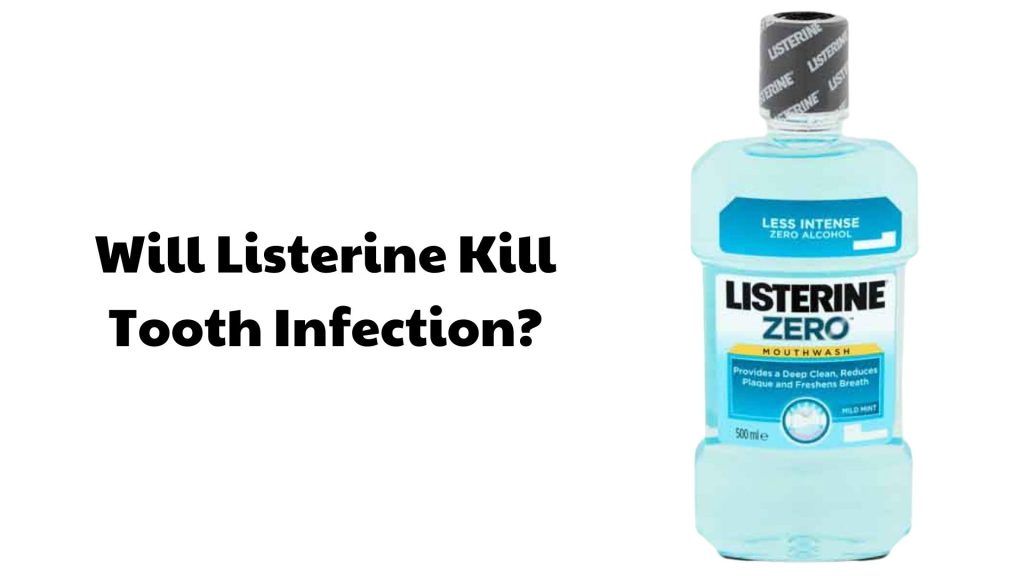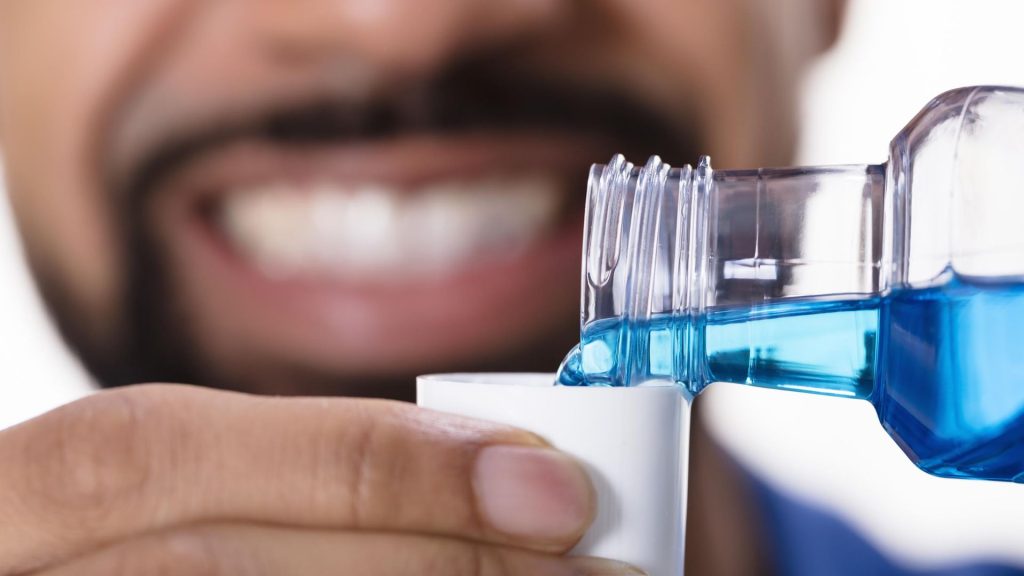Will Listerine kill tooth infection? Listerine is an antimicrobial mouthwash made with ethanol, aromatic oils, and fluoride. While Listerine may help lower the number of germs in your mouth and give temporary relief for certain oral conditions, it is not a replacement for appropriate dental care or a proven therapy for a tooth infection. A beautiful smile and healthy teeth are our pride. Oral health improves communication, smiles, and physical health. Home dental care and dentist visits should be balanced. Let’s investigate this product’s dental health and infection treatment benefits.
What Is Listerine?
Listerine mouthwash is known for its antibacterial and other mouthwash components. This brand has been around for a long time and has become one of the market’s most popular mouthwash products. Joseph Lawrence and Jordan Wheat Lambert invented Listerine in 1879. The brand is named after Sir Joseph Lister, an English physician who made significant advances in cleanliness and antibacterial treatment. The first Listerine solution was for surgery and infection treatment. It was then turned into a mouthwash meant to preserve oral and respiratory health.
Listerine Ingredients
Let’s begin with what goes into one of the most well-known mouthwashes, Listerine. Looking into the ingredients in Listerine may shed light on claims that it can prevent and treat tooth infections:
- Cetylpyridinium chloride (CPC).
- Thymol.
- Eucalyptol.
- Menthol.
- Ethanol (ethyl alcohol).
- Water.
So, read your Listerine product’s label to find out what it contains, since ingredients may vary per formulation. We looked into the Listerine composition since we were inquisitive about its benefits on tooth health and had great expectations for it. While regular dental checks are still required, taking Listerine in between sessions may assist in keeping your mouth clean and healthy. It may be more difficult than you think to prove that Listerine kills tooth infections. Discuss Listerine’s disputed oral infection-fighting qualities next.
Will Listerine Kill Tooth Infection?

Unfortunately, the answer is no; using Listerine won’t help with a tooth infection. Oral health professionals debate Listerine’s dental infection-fighting power. Antibacterial Listerine mouthwash is touted as cleaning and freshening breath.
However, it cannot replace dentist-treated tooth infections. The infection of a tooth is a dangerous condition that requires medical attention. Listerine may be useful as part of everyday oral care to decrease germs and promote a sense of cleanliness, but it cannot prevent tooth problems on its own. To treat a tooth infection, see a dentist for consultation and proper treatment, which may include the use of antibiotics if required.
So, Listerine may aid everyday oral care but cannot replace dentist-treated tooth infections. We’ve discovered that Listerine’s tooth infection-fighting capacity isn’t always straightforward. Despite numerous ads and great reviews, Listerine is not the only effective tooth infection treatment.
What Listerine Tooth Infection Studies Have Been Done?
The medical community and mouthwash users have shown interest in research and trials exploring the use of Listerine to remove tooth infections. Here are some significant findings from the study and testing:
- Antibacterial and antibacterial: Listerine comprises CPC, thymol, eucalyptol, and menthol. These substances have been demonstrated to decrease and inhibit oral bacteria development, cleaning the mouth and freshening breath.
- Reduces bad-breath bacteria: Using Listerine has been shown in several studies to decrease the number of germs in the mouth and improve breath.
- Effective in treating dental infections: Listerine has been shown to lessen inflammation and kill certain tooth infection-causing bacteria, but it is not enough to substitute therapy. professional care.
- Limitations of Listerine: Listerine may combat germs in the mouth, but professional dental care is needed for severe tooth infections. Studies suggest that Listerine alone cannot eradicate oral infections.
In short, Listerine has been studied and tested to preserve oral health and minimize foul-breathing bacteria, but it seldom eliminates dental illnesses. Serious dental infections are best treated by a dentist. Listerine does not cure dental infections. Instead, it may be part of everyday oral care to minimize bacteria and clean. Check with your dentist and follow the advice to protect your health. Nonetheless, that’s not all we do.
Details On Using Listerine To Prevent Tooth Infections

So, how you should use Listerine to keep your teeth and gums healthy? In addition to regular dental checkups, this may help you maintain better oral hygiene at home.
Step 1: Choose the right Listerine product
To begin, Listerine products vary in their antibacterial aims and components. To prevent the possibility of tooth infections, use an antibacterial and antifungal treatment.
Step 2: Prepare
It’s recommended to brush your teeth before using Listerine. Listerine’s effectiveness is enhanced by rinsing, which removes plaque and food particles.
Step 3: Use proper dose
The right amount of Listerine to use is usually between 20 and 30 ml, which is about 2 bottle caps. If you use too little of the product, it might not work as well.
Step 4: Wash your mouth properly
The next step is to use Listerine for a 30-second to a minute-long mouthwash. You should gargle mouthwash on a regular basis to keep your teeth, gums, and tongue healthy. We now know that using Listerine regularly may protect against cavities and gum disease. While they may help protect your teeth and smile, these measures alone are insufficient. Please find some supporting reading materials here. The first step toward permanent dental health is the regular use of Listerine to avoid tooth infections.
Conclude
To learn how effective Listerine is in preventing tooth infections, we analyzed the product and its recommended usage. While using Listerine may help alleviate some of the discomfort associated with a tooth infection, it is not a substitute for seeing your dentist regularly.
Regular dental checkups not only aid in the early diagnosis and treatment of tooth infections but also in their prevention. To maintain your smile, visit Spring Orchid Dental Clinic. Consider each Spring Orchid dentist appointment a step toward greater oral and overall wellness. If you want to maintain a beautiful and healthy smile, the dentist here can help with checkups, treatments, and professional advice. Whether you use Listerine or not, regular dental visits are essential. For the best tooth care, visit Spring Orchid Dental Clinic. We are always eager to welcome you and serve you with devoted and knowledgeable service.
FAQs
What’s The Best Tooth Infection Mouthwash?
There may not be a “best” mouthwash, but regular use may help maintain healthy teeth and reduce the likelihood of infection. Find the finest mouthwash for your needs by trying the ones below:
- Fluoride-containing mouthwash.
- Mouthwash has xylitol.
- Antibacterial mouthwash.
- Mouthwash without alcohol.
- Natural components are used in mouthwash.
Talk to your dentist before buying any mouthwash. Dentists are trained to evaluate patient needs and provide the most appropriate treatment plan. If you want to get the most out of your purchase, do as directed.
How Long Does Listerine Destroy Bacteria?
It takes at least 30 seconds for Listerine to start killing germs in your mouth. The time it takes for Listerine to eliminate germs varies not only by the kind of Listerine product used but also by how it is used and the state of the user’s mouth.
What Heals Tooth Infections?
A tooth infection may need the assistance of a dentist, depending on the severity of the illness. Infected teeth may be treated in a few different ways.
- Use antibacterial mouthwash.
- Daily dental care is needed.
- Use warm salt water to rinse your mouth.
- Treat gum disease.
- Keep track of post-treatment care.
- Use antibiotics.
To summarize, if you suspect a tooth infection or see any symptoms such as pain, swelling, or an unpleasant odor in your mouth, you should contact a dentist straight away. Early treatment of a tooth infection may help avoid more serious problems and maintain great oral health.





